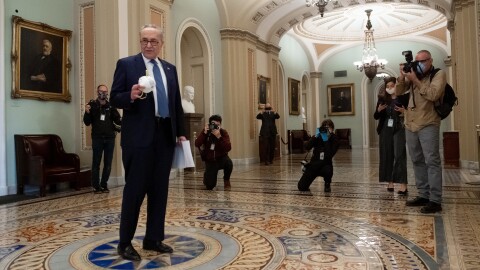President Trump signed another coronavirus relief package into law Friday. The bulk of that nearly $484 billion sum goes to the Small Business Administration, the agency tasked with getting money in the hands of companies struggling during the ongoing pandemic.
One of the SBA's most popular programs has taken heat in recent days over who has access to funding. Local business owners were eager and hopeful for support when the first wave of money was approved for Ohio about a month ago.
At that time, I was on the phone with Elizabeth Blount McCormick when she found out Ohio businesses could start applying for the Economic Injury Disaster Loan (EIDL) program.
“Awesome, I just can’t get on the site,” she laughed. “That is awesome.”
Blount McCormick runs the Uniglobe Travel agency, and for her, the process was pretty easy. She applied on March 20 and received a check from the SBA a little over three weeks later.
“I can’t disclose the amount, but I’ll tell you that it was—I saved the business—I can tell you that," Blount McCormick said when I checked back recently. "And I’m super excited about that."
But that hasn’t been the story for many business owners around the country. The SBA quickly burned through its initial round of funding for EIDL and the much larger Paycheck Protection Program.
More money is coming, but not after a lot of criticism: during that first pass, many small businesses were left out while larger companies were able to get funding. That's because the legislation considers restaurant and hotel chains “small” so long as the individual locations employ fewer than 500 people.
Last month, Tiger + Lily restaurant owner Tom Chang said any support at all would be huge help. So far, he hasn’t gotten any.
“No, I missed out,” he says. “There was a couple of days that was very frantic once we heard the rumblings of the funds are running dry.”

Like Blount McCormick, Chang applied for both EIDL and PPP. Although Blount McCormick has received some money, they’re both eagerly waiting on the Paycheck Protection dollars. That funding comes in the form of a forgivable loan, so long as recipients use the majority to keep workers on their payroll.
“A few months ago, we were in the process of expanding, and then all of the sudden this happens, so now we’re trying to survive and now the program that’s supposed to help us survive, now it’s helping or at least it’s going toward bigger companies,” Chang says. “It’s been very, very difficult.”
SBA Great Lakes regional administrator Rob Scott says what they’re seeing is unprecedented.
“We approved more loans in two weeks than we have, as far as dollar amount, in 14 years of the agency,” he says. “We approved more applications in two weeks than we have since we were founded in 1963.”
The traffic already forced the SBA to install a new system for processing applications. That hiccup forced people like Josh Quinn, owner of Tigertree apparel in the Short North, to repeatedly fill out applications.
“We sort of have been lost in the shuffle on the PPP, and then just because of the system, we’ve been lost in the shuffle on the disaster loan,” he says. “It’s very frustrating as a business that feels like they’ve done everything by the book from day one, basically three different times now.”
Scott insists no applications were lost in the changeover, and notes one of the agency’s follow-up requests had to do with a $10,000 advance Congress added to the disaster loan program after the fact.
With new money on its way, Scott says the SBA will be ready to start accepting applications and getting money out the door. But at least for PPP, the turnaround time will depend on banks and other lending institutions.
“Once we turn it off, there is no queue system where a lender can submit an application and there’s a line—there is no line,” he says, “So once it’s turned back on, it’s up to the lender, whether they have a line with their customers or not, to put those into our system.”
To stay positive while he waits, Chang poured his efforts into donating food to health workers. He sends 20 or 30 meals a few times a week, along with a group of other Chinese restaurant owners.
But he notes the wait is taking its toll. They started out with more than a dozen restaurants helping out. Now, they're down to six.
Do you have questions about Ohio's coronavirus response? Ask below as part of our Curious Cbus series.
_






